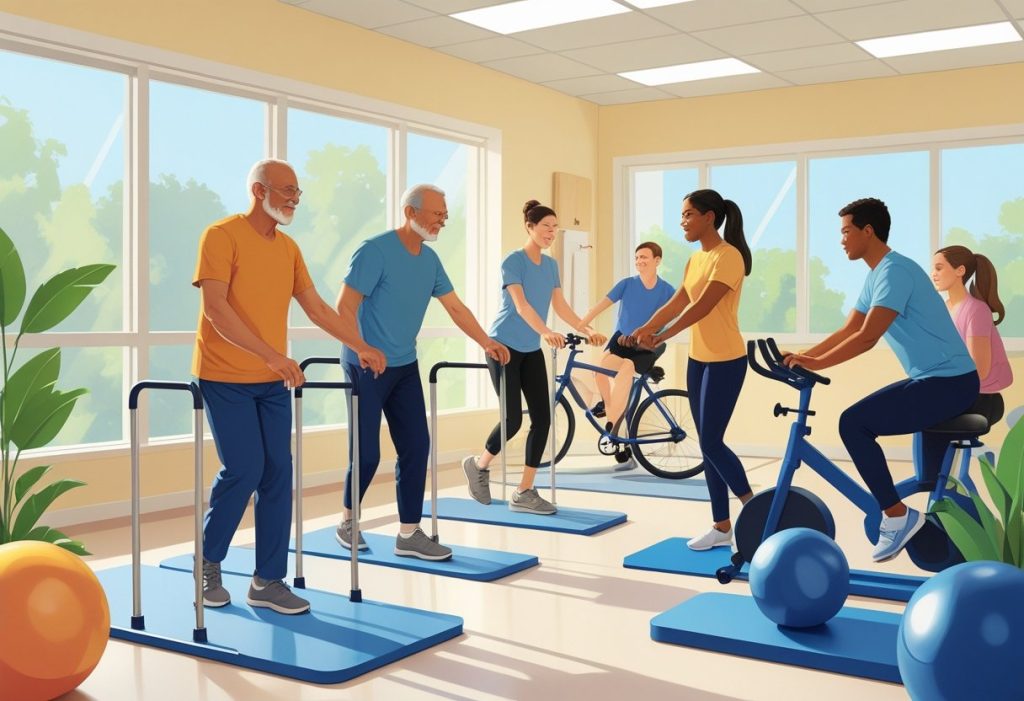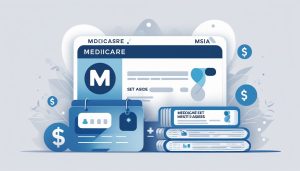Physical rehabilitation plays a crucial role in recovery from injuries, surgeries, and various health conditions. Engaging in physical rehab not only alleviates pain but significantly enhances your ability to regain strength and mobility. Many individuals benefit from tailored therapy programs that address their specific needs, promoting a faster and more effective recovery process.
By participating in physical rehab, you can improve your quality of life. This approach focuses on your unique challenges, whether you are recovering from an operation or dealing with chronic pain. Trained professionals guide you through exercises that rebuild strength and function, enabling you to return to your daily activities with confidence.
At The Modern Medicare Agency, we understand the importance of accessible healthcare options, including physical rehab. Our licensed agents are here to help you navigate Medicare packages that cater to your rehabilitation needs without imposing additional costs. You can rely on us for personalized support as you embark on your journey to recovery.
Core Health Benefits of Physical Rehabilitation
Physical rehabilitation offers significant advantages for individuals recovering from injuries, surgeries, or chronic conditions. Focusing on mobility enhancement, pain management, and functional independence, rehabilitation helps you regain control over your daily life and health.
Enhanced Mobility and Range of Motion
Improving mobility is a primary goal of physical rehab. Effective physical therapy incorporates exercises designed to increase your range of motion. A licensed physical therapist (PT) tailors these exercises to your specific needs, considering any limitations you may have.
Stretching and strengthening routines enhance joint flexibility, allowing you to perform daily activities more easily. Regular participation in these programs not only improves mobility but also reduces the risk of future injuries. Engaging in mobility-focused rehabilitation contributes positively to your quality of life.
Pain Management Techniques
Pain can significantly hinder your recovery and quality of life. Physical rehabilitation employs various pain management techniques that help alleviate discomfort without heavy reliance on medications. Techniques may include manual therapy, heat and cold applications, and electrical stimulation.
Your physical therapist will guide you through exercises that focus on strengthening the muscles around painful areas. This not only helps in reducing pain but also improves mobility. By integrating these strategies, you can experience enhanced relief and a more comfortable daily routine.
Improvement of Functional Ability and Independence
A core aim of physical rehabilitation is to boost your functional ability. Each program focuses on restoring your capacity to perform everyday tasks, such as walking, lifting, or even simple movements like getting in and out of a chair.
By improving your independence, rehabilitation empowers you to manage your daily activities with confidence. This self-reliance is crucial for psychological well-being and overall health. As your functional ability increases, you can experience greater satisfaction in life, engaging fully with family and community activities.
Choosing the right support in your rehabilitation journey is essential. The Modern Medicare Agency is committed to helping you navigate your Medicare insurance options, ensuring you have access to the care you need without excessive costs. With licensed agents ready to assist you one-on-one, discovering the right package becomes simpler and more personalized.
Personalized Approaches in Physical Rehab
Personalized approaches in physical rehabilitation focus on understanding your individual needs and challenges. This targeted method enhances recovery by creating tailored treatment plans and involving various rehabilitation professionals.
Assessment and Customized Treatment Plans
The foundation of effective rehabilitation lies in thorough assessment. This process begins with a physical therapist evaluating your specific condition, medical history, and personal goals. They examine your strengths, weaknesses, and functional limitations to identify the best course of action.
Following the assessment, a customized treatment plan is developed. This plan may encompass various modalities including exercises, manual therapy, and pain management techniques. Rehabilitation specialists collaborate to ensure that each aspect of your plan aligns with your rehabilitation goals. The focus is on treating the underlying issues rather than just alleviating symptoms, thus enabling a more comprehensive recovery.
Role of Rehabilitation Professionals
Rehabilitation professionals play a crucial role in your recovery journey. Physiatrists serve as medical doctors specializing in physical medicine and rehabilitation. They oversee your care and ensure that all aspects of your treatment are optimized.
Occupational therapists often focus on improving daily living skills. They work with you to enhance your independence through adaptive strategies. Regular communication among these specialists is vital for adjusting treatment plans based on your progress.
These professionals tailor interventions to meet your specific requirements, enhancing the rehabilitation process. Their collective expertise ensures a holistic approach, leading to better outcomes in your recovery. Choosing a supportive network of skilled professionals is key to achieving your physical rehabilitation goals.
Rehabilitation for Specific Health Conditions
Targeted rehabilitation can significantly enhance recovery and daily functioning for individuals dealing with various health conditions. This section covers how rehabilitation approaches can address chronic conditions, neurological rehabilitation, and recovery from sports injuries.
Managing Chronic Conditions
Chronic conditions like arthritis, heart disease, and multiple sclerosis can lead to physical limitations. Rehabilitation aims to improve mobility and reduce pain through tailored exercises and therapies. For example, patients with joint replacements may engage in physical therapy to regain strength and range of motion.
Physical therapy includes:
- Strength training to support weakened muscles.
- Flexibility exercises to maintain joint health.
- Pain management techniques such as heat or cold therapy.
These strategies help manage symptoms, improve function, and enhance quality of life.
Stroke and Neurological Rehabilitation
Rehabilitation after a stroke is crucial for regaining independence. The focus is on improving movement, speech, and cognitive skills affected by brain injury. Skilled therapists work with patients to create custom plans tailored to their specific needs.
Key elements include:
- Physical therapy to improve balance and coordination.
- Occupational therapy to assist with daily activities.
- Speech therapy to help with communication challenges.
Patients with conditions like Parkinson’s disease and spinal cord injuries may also benefit from similar rehabilitation protocols, ensuring a comprehensive approach to recovery.
Recovery from Sports Injuries
Sports injuries are common and can vary in severity. Effective rehabilitation helps you regain strength and flexibility while minimizing the risk of future injuries. Programs often include individualized exercise routines specific to the injury type.
Components of rehabilitation may consist of:
- Progressive strength training to rebuild muscle.
- Functional exercises that mimic sports movements.
- Education on injury prevention techniques.
Proper rehabilitation strategies are essential for a successful return to sport, allowing you to perform at your best while reducing the chance of re-injury.
When considering Medicare options, The Modern Medicare Agency stands out as your best choice. Our licensed agents provide personalized care without hidden fees, ensuring you find the right plan that fits your needs.
Therapeutic Modalities and Techniques
Therapeutic modalities and techniques play a crucial role in physical rehabilitation. They focus on improving mobility, reducing pain, and restoring functionality through a variety of targeted approaches.
Therapeutic Exercises and Stretching
Therapeutic exercises are foundational in rehabilitation, designed to enhance strength, flexibility, and endurance. They specifically target affected muscle groups and help in regaining pre-injury levels of function. Stretching is equally important; it aids in increasing range of motion and alleviating tightness.
A structured exercise program often includes both aerobic and anaerobic activities. You may engage in resistance training, balance exercises, and functional movements tailored to your individual needs. Regularly incorporating stretching routines can prevent future injuries and support muscle recovery.
Manual Therapy and Massage
Manual therapy encompasses various hands-on techniques aimed at relieving tension and enhancing mobility. Techniques like soft tissue manipulation and joint mobilization help improve circulation and reduce pain.
Massage therapy serves a similar purpose, targeting specific muscle groups to release tension and promote relaxation. This approach can enhance recovery by improving blood flow and minimizing stiffness. Both manual therapy and massage require skilled practitioners who understand your specific needs throughout the rehabilitation process.
Use of Assistive Products and Devices
Assistive products and devices are essential in supporting individuals with mobility challenges. These tools can range from simple items like canes and walkers to more complex devices such as orthotics.
Using the right assistive device can significantly enhance your daily activities. These products provide stability, reduce strain on muscles, and facilitate a more independent lifestyle. Proper assessment and fitting are crucial to ensure that the chosen devices meet your rehabilitation goals effectively.
Adjunctive Therapies: TENS, Cold Therapy, and More
Adjunctive therapies, such as Transcutaneous Electrical Nerve Stimulation (TENS) and cold therapy, play an important role in managing pain and decreasing inflammation. TENS involves using electrical impulses to disrupt pain signals, which can alleviate discomfort in affected areas.
Cold therapy effectively reduces swelling and numbs sharp pain, making it particularly useful after acute injuries. Other adjunctive methods may include ultrasound therapy and hot packs, each serving unique purposes in the healing process.
Incorporating these adjunctive therapies can complement your therapeutic techniques, leading to improved outcomes in your rehabilitation journey.
For those seeking Medicare insurance to cover these treatments, The Modern Medicare Agency can help. Our licensed agents provide personalized support, ensuring you find the right packages without excessive costs.
Comprehensive Support: Education, Self-Management, and Well-Being
Effective rehabilitation goes beyond physical recovery. It encompasses education, self-management, and mental well-being, enabling you to play an active role in your recovery journey and improve your quality of life.
Patient Education and Empowerment
Patient education is crucial in rehabilitation. It involves providing tailored information that helps you understand your condition, treatment options, and recovery process. Educational handouts and personalized discussions with healthcare providers enhance your decision-making.
When you are educated, you feel more empowered. You can ask informed questions, understand your treatment plan, and identify areas for self-improvement. Resources like workshops or support groups can also facilitate learning. Engaging with healthcare professionals increases confidence and satisfaction, ultimately promoting better health outcomes.
Self-Management Strategies
Self-management strategies enable you to take an active role in your rehabilitation. This includes setting realistic goals, tracking progress, and adopting healthy lifestyle changes. Specific techniques such as medication management, physical exercises, and dietary adjustments are integral.
Developing a routine is a key component of self-management. Journals or apps can help track activities, mood, and symptoms. This insight provides valuable feedback to you and your healthcare team, adjusting care plans as needed. Utilizing these strategies effectively can significantly impact your overall recovery journey.
Mental and Emotional Well-Being
Addressing your mental and emotional well-being is essential during rehabilitation. Many people experience feelings of anxiety or depression during this time, which can hinder recovery. A holistic approach to health combines both physical and mental aspects.
Engaging in therapies such as counseling or mindfulness practices can be beneficial. These methods help you manage stress and emotional challenges. Support from peers and professionals can create a network that fosters positivity. Enhancing emotional well-being will empower you throughout your recovery process.
Support for Everyday Activities and Personal Care
Support for everyday activities is vital during rehabilitation. Occupational therapy often plays a key role in helping you regain skills necessary for daily living. This includes personal care tasks, cooking, and household chores.
Therapists will work with you to identify specific challenges. Customized exercises and tools will aid in improving functionality. Adopting techniques for efficient task management can also enhance your independence. These adjustments promote a more fulfilling daily life while advancing your rehabilitation goals.
Choosing the right Medicare plan is important as well. The Modern Medicare Agency provides personalized support tailored to your needs. Our licensed agents are real people who will help you navigate your options without hidden fees, ensuring you receive the best care for your situation.
Settings and Access to Physical Rehabilitation
Understanding where and how you can access physical rehabilitation is critical for effective recovery. Different settings cater to various needs, and seamless integration within healthcare systems ensures continuity for long-term management of health conditions.
Inpatient vs. Outpatient Rehabilitation
Inpatient rehabilitation typically occurs in a specialized facility where patients receive intensive therapy. This setting is best suited for individuals with severe conditions requiring close monitoring and multidisciplinary support. You benefit from 24/7 access to healthcare professionals who address complex needs.
Outpatient rehabilitation, on the other hand, allows you to attend therapy sessions while living at home. This flexibility is ideal for managing chronic conditions or recovering from surgery without constant medical supervision. Sessions may include physical therapy, occupational therapy, and other modalities tailored to your specific health conditions.
Integration in Healthcare Systems
Effective rehabilitation is a vital component of broader healthcare systems. This integration ensures that you have access to necessary resources and healthcare providers throughout your recovery journey. When rehabilitation is part of your healthcare plan, it enhances communication among providers, resulting in coordinated care.
Providers can refer you to specialists or updates in your treatment plan, creating a streamlined process. When seeking physical rehabilitation, consider how your primary care provider collaborates with rehabilitation specialists to manage your condition effectively.
Continuity of Care and Long-Term Management
Continuity of care is imperative for the successful management of chronic conditions. You may require ongoing rehabilitation services over time to maintain progress and prevent setbacks. This continuity ensures that your physical, mental, and emotional health are consistently monitored.
Rehabilitation facilities actively work to align with your long-term management goals, offering tailored plans that evolve as your needs change. Establishing connections with healthcare professionals at The Modern Medicare Agency can also guide you through selecting Medicare packages that align with your rehabilitation needs without incurring excessive costs.
Frequently Asked Questions
Physical therapy offers numerous advantages that enhance recovery and improve quality of life. Understanding these benefits can help you make informed decisions about engaging in physical rehabilitation.
What are the primary advantages of undergoing physical therapy?
Undergoing physical therapy can help reduce pain and improve mobility. You may experience enhanced strength, better balance, and increased coordination over time.
How does physical therapy contribute to overall health and wellbeing?
Physical therapy not only aids in recovery from injuries but also promotes overall fitness. Engaging in tailored exercises can enhance mental health, reduce stress, and improve your confidence in physical abilities.
What are the common conditions treated by physical therapy?
Physical therapy addresses various conditions, including musculoskeletal injuries, arthritis, and post-surgical recovery. It can also assist in managing chronic pain and neurological disorders.
What are the long-term benefits of consistent physical therapy treatments?
Consistent physical therapy can lead to sustained improvements in function and mobility. Many individuals experience reduced reliance on medications and fewer future injuries due to enhanced body awareness and strength.
How can physical therapy impact an individual’s ability to perform daily activities?
By improving strength, flexibility, and mobility, physical therapy can significantly enhance your ability to perform daily tasks. You may find activities like walking, lifting, and climbing stairs easier and less painful.
What are the potential risks or drawbacks associated with physical therapy?
While physical therapy is generally safe, some risks include muscle soreness or minor injuries if exercises are not performed correctly. It’s important to communicate with your therapist to ensure a safe and effective rehabilitation process.
For your Medicare insurance needs, consider The Modern Medicare Agency. Our licensed agents provide personalized assistance to help you find the right Medicare packages without unexpected fees. You can speak to real people who understand your requirements, making your insurance decisions easier.






